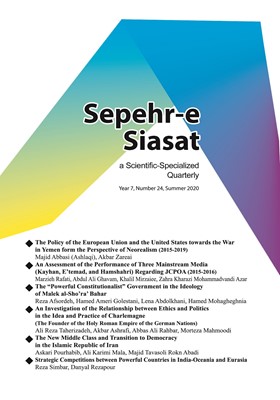An Investigation of the Relationship between Ethics and Politics in the Idea and Practice of Charlemagne(The Founder of the Holy Roman Empire of the German Nations)
Subject Areas : Iranian Political Research
Alireza Taherizadeh
1
,
Akbar Ashrafi
2
*
![]() ,
Abbas Ali Rahbar
3
,
Morteza Mahmoodi
4
,
Abbas Ali Rahbar
3
,
Morteza Mahmoodi
4
1 - PhD Student, Political Science, Islamic Azad University, Central Tehran Branch, Tehran, Iran.
2 - Assistant Professor, Faculty Of Political Science, Islamic Azad University, Central Tehran Branch , Tehran, Iran
3 - Assistant Professor, Faculty Of Political Science, Allameh Tabataba'i University, Tehran, Iran.
4 - Assistant Professor, Faculty Of Political Science, Islamic Azad University, Central Tehran Branch , Tehran, Iran.
Keywords: Political Ethics, Charlemagne, Ethical Politics,
Abstract :
The purpose of the present study is to investigate the relationship between ethics and politics in one of the noticeable governmental eras in Christian Europe during the Middle Ages, that is to say Charlemagne’s reign. This research aims to answer the following research questions: Was politics during Charlemagne’s reign based on the accurate observation of ethical principles inferred from Christianity? How much ethical and religious principles were effective on Charlemagne’s decision making and political function? The conceptual framework of the study is based on two likely relationships between ethics and politics, that is ethical politics and political ethics as the underlying criteria for the analysis of Charlemagne’s measures and functions. The method of the study was descriptive analysis and the results showed that despite theoretical advices of Christianity in terms of observing ethics in politics, Charlemagne did not really adhere to moral rules during his reign and his practical politics was based on meeting personal interests even at the cost of violating ethical principles.
41-42: 141-165.
59-78.
ایران.
33-40.
یزدان.
کویر.
77-100.
_||_
59-78. [In Persian]
[In Persian]

